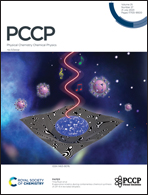Electrochemical assessment of a tripodal thiourea-based anion receptor at the liquid|liquid interface†
Abstract
Thiourea-based receptors for anions have been widely studied due to their ability to transport anions across phospholipid bilayers. The binding affinity of a tripodal thiourea-based receptor for anions was assessed at the aqueous|organic interface using electrochemical measurements. A 1 : 1 stoichiometry was determined for the complexation of most anions, with a higher stoichiometry found in the presence of excess Cl− and Br− anions. High stability constants were estimated for the formation of the complexes at the aqueous|1,2-dichlorobenzene (DCB) interface. When compared with an organic solvent of higher polarity, nitrobenzene (NB), the high stability constants observed in DCB are believed to be due to the less competitive environment of the less polar solvent. Protonation of the receptor at the bridgehead tertiary amine was also inferred from the potential-dependent voltammetric measurements that are not related to anion:receptor complexation. The inherent advantages of the electrochemical method with the use of low polarity solvents are expected to provide new insights into the binding and transport of newly-developed neutral receptors.



 Please wait while we load your content...
Please wait while we load your content...